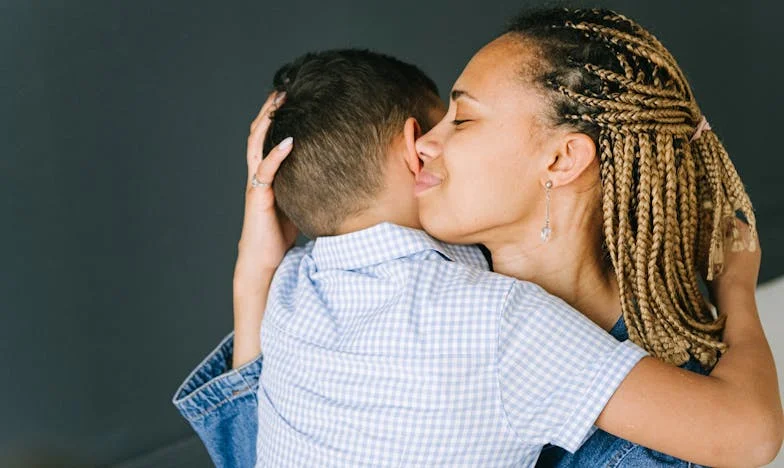The Door to Betrayal
“Why is your car here, Emily?” I muttered, staring at our driveway through the rain-streaked windshield. My hands gripped the steering wheel so tight my knuckles whitened. The plan was I’d surprise her. Three months hauling freight across the Midwest—enough time for the miles to grind away loneliness, but not nearly enough to prepare for what I was about to find. It was early, not even 2 PM. She shouldn’t be home.
I swung open the front door, the familiar creak echoing through our small Ohio townhouse. The living room was silent, eerily so, with the TV off and our son’s toys scattered in the corner. My boots thudded on the hardwood as I moved towards the bedroom, my mind racing. Maybe she was sick. Or maybe—
A muffled laugh stopped me. A man’s laugh.
I froze. My heart hammered in my chest. “Emily?” My voice sounded foreign, hollow.
Footsteps. The bedroom door opened. Emily stood there, eyes wide, her hair mussed and cheeks flushed. Behind her, I glimpsed someone scrambling to pull on his jeans. I’d never seen the guy before. He looked barely out of college, with a tattoo peeking from beneath his sleeve. My mind blanked, then ignited with heat.
“Mark—” she started, stepping forward, but I backed away, shaking.
“Who the hell is this?” My words came out louder than I intended. Our son, Nate, barely four, peeked from his bedroom down the hall. He clung to his stuffed bear, eyes round and scared.
The man mumbled, “I’ll go,” grabbing his shoes and making for the door. I barely registered him brushing past me. I was still staring at Emily, betrayal twisting her features into someone I didn’t know.
“Mark, please—” she pleaded, tears springing to her eyes. “I never wanted you to find out like this.”
“How long?” I spat. “How long has this been going on?”
She looked down, twisting her wedding ring. “A few months. I—I was so lonely, Mark. You’re always gone. I didn’t know how to talk to you anymore.”
Rage and humiliation warred inside me. I heard my own voice, shaky and raw. “So you just… let someone into our bed? Into Nate’s home?”
She sobbed then, covering her face, sinking to the floor. Nate whimpered, and I stumbled over to scoop him up, holding him tight. My mind reeled with memories—our wedding at the old white church, the mortgage we scraped together for this place, the late-night calls from truck stops promising her I’d be home soon.
I spent the night on the couch, staring at the ceiling. Emily came in around midnight, her face puffy, eyes red. She sat on the floor next to me, knees pulled to her chest.
“I’m sorry,” she whispered. “I know I destroyed everything.”
I didn’t answer. I couldn’t. I was thinking of my own father, who left when I was ten, how my mother spent nights crying in the kitchen, how I swore I’d never do that to my own kid.
The days blurred. I left for a motel, came back to pack a bag, watched Emily trying to keep life normal for Nate—cartoons in the morning, peanut butter sandwiches cut into stars. Every time I looked at her, I saw the stranger in our house, the cracks in the foundation of our marriage. My buddies from the trucking company said to leave her, take Nate, start over. My mom said forgiveness was the only way families survived. My sister, who never liked Emily, didn’t say anything at all.
Emily tried to explain. We sat at the kitchen table one rainy Tuesday, the same gray light filtering through the window as the day I found out. “You were always gone. I was working, raising Nate, paying bills. I felt like a single mom. I needed someone to listen. He was just… there. It was stupid. I’m so sorry.”
“Why didn’t you tell me you were hurting?” I asked, voice breaking. “Why didn’t you ask for help?”
She reached for my hand. I let her take it, numb. “I was scared you’d think I couldn’t handle things. You work so hard, Mark. You try so hard for us. I didn’t want to be another problem.”
Some nights I drove my rig just to get away, circling the empty highways, radio low. I thought about what it meant to forgive, and what it would do to Nate if I couldn’t. I remembered the promises we made, the good years, the feeling that home was wherever she was. But now home just felt like four walls and a broken trust.
We tried counseling. We learned to talk again, to sit in our pain and not run from it. Some days, I hated her. Some days, I hated myself. Other days, I looked at Nate’s drawings on the fridge, our wedding photo on the mantel, and wondered if love was really stronger than betrayal.
It took nearly a year before we found a fragile peace. I don’t know if I’ll ever forget, or if I’ll ever trust her the way I did before. But we’re trying, for Nate, for ourselves. Some nights, when the house is quiet, I lie awake and wonder: did I make the right choice staying? Will I ever feel whole again?
I look at my family and ask myself—does forgiveness really mean forgetting, or is it just learning to live with the scars? What would you do if you were in my shoes?
